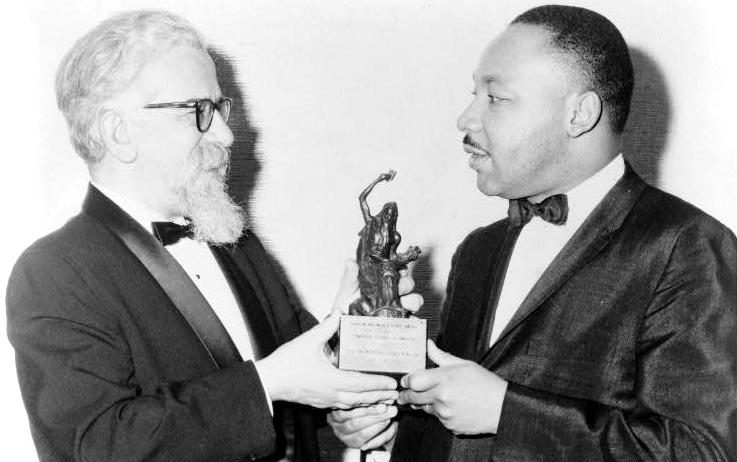“A religious man is a person who holds God and man in one thought at one time, at all times, who suffers harm done to others, whose greatest passion is compassion, whose greatest strength is love and defiance of despair.” —Rabbi Abraham Heschel
In 1994, my physician urged me to go on medical disability for HIV, diagnosed in 1985. “If statistically you only have a year or two left, why don’t you travel or do some things you have always wanted to do?” he asked nonchalantly.
With my new free time, I re-read Rabbi Abraham Joshua Heschel’s Man Is Not Alone (Farrar, Straus, and Giroux). At mid-life and suddenly on disability, I found myself drawn to his philosophy that “just to live is holy.”
I try to live like Heschel every day, in “radical amazement,” with reverence, wonder, and gratitude. Having long outlived my doctor’s predictions, I find Heschel’s philosophy just as compelling now and believe his teachings can inspire all people. Heschel has taught me to value life at every moment, even in the midst of illness, and to fight for important social justice issues.
This year marks the centennial of the birth of Heschel, considered one of the 20th century’s greatest theologians. Like Martin Luther King Jr., with whom he marched in Selma, Alabama, Heschel was a religious leader for all. He worked particularly closely with Catholics, allying himself with Father Daniel Berrigan in the anti-Vietnam War movement and contributing to the Second Vatican Council. When Heschel died in 1972, the Catholic Jesuit journal America published an entire issue on him, the only Jewish person to receive this honor.
Born in 1907 in Warsaw, Poland, Heschel was the descendant of some of the most important rabbis of Eastern Europe. As early as age 4, he was recognized as having an intellect far beyond his years. Heschel’s first published work was a book of poetry in Yiddish, which for centuries had been the common language of the world of Eastern European Jews.
It was a world headed for extinction in 1940, when Heschel arrived in the United States. Having lost many of his relatives and colleagues in the Holocaust, he was keenly aware of surviving the slaughter—“I am a brand plucked from the fire, in which my people were burned to death.”
I am a brand plucked from fire, in which my people were burned to death.
Rabbi Abraham HeschelAdvertisement
Although he spoke little English when he arrived here, Heschel published some of the most influential books on religion ever written, including Man’s Quest for God (1954), God in Search of Man (1955), and The Prophets (1962). His interests spanned all religions, and he cherished his relationships with men like Protestant theologian Reinhold Niebuhr and King. Heschel said that the Selma march “was like praying with my legs.”
Heschel made history at the Second Vatican Council as a major influence on the church’s declaration of its relations to non-Christian religions, Nostra Aetate, which in 1965 ushered in a new relationship between Catholics and Jews. Heschel’s friendship with Cardinal Augustin Bea, head of the Vatican’s interfaith efforts, gave new meaning to the word “interfaith.” He was instrumental in representing American Jewry to the Vatican, and he was both praised and criticized for his involvement. But Heschel was never one to retreat from controversy.
Heschel’s teachings are a daily reminder to me of Judaism’s notion of tikkun olam, or repairing the world. One’s deeds are paramount in Judaism. Heschel was totally committed to social justice and equality—“God is either the Father of all men, or the father of no man,” he wrote. He spoke out when many did not want to hear. He believed that the opposite of good was not evil, but indifference.
Heschel died on a Sabbath in 1972 in his sleep, which his daughter, Susannah (a professor of Judaic studies at Dartmouth University), reminds us is a “kiss from God” in Judaism. He had written that we cannot afford to waste or “kill time.” Knowing that he escaped death at the hands of the Nazis by a mere six weeks must have contributed to his own sense of radical amazement and his deep commitment to social justice and interfaith understanding.
He believed that the opposite of good was not evil, but indifference.
Having faced my own mortality and lost friends, colleagues, and patients to AIDS, a worldwide plague killing millions, Heschel’s teachings help me deal with life and death. Reading Heschel’s works and trying to follow his teachings have led me to see my life as full, to be grateful for my family and friends, and to recommit myself to social activism—protesting the war in Iraq, working with AIDS charities, and volunteering at community mental health organizations.
As I get older, I more fully understand Heschel’s awe of the richness of God’s creation and his statement “that for the pious man, it is a privilege to die.” In a world that often seems devoid of prophets, we are blessed to have the writings, the teachings, and the legacy of this great man.
This article also appears in the December 2009 issue of U.S. Catholic (Vol. 74, No. 12). Click here to subscribe to the magazine.
Image: Wikimedia Commons/Library of Congress














Add comment